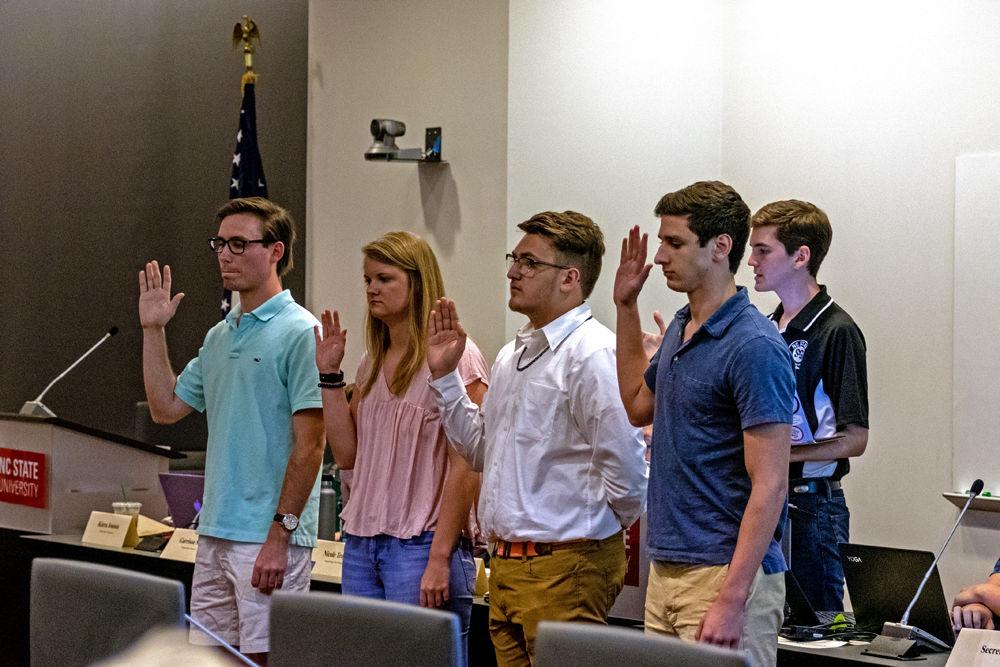
Connor Smith
Student Senate President Mitchell Moravec, a graduate student studying public administration, walks newly appointed senators through the oath of office during the student senate meeting in Talley on Wednesday, April 24. Student senate meetings happen in room 4140 bi-weekly on Wednesdays.
On Wednesday, Sept. 4, the 99th session Student Senate met to appoint several people to treasury positions and approved eight pieces of legislation.
Three senators resigned since the last Senate session: Bryce Safrit, a second-year studying industrial engineering, Sophia McMahan, a fifth-year studying political science, and Mak Pryor, a Ph.D. student in psychology. All resignations were accepted.
Iain Dixon, a fourth-year in computer science and applied math, was appointed as Senate Webmaster for the 99th session.
Four students were appointed to treasury positions. Student Body Treasurer Garrison Seitz, a second-year in civil engineering, explained there are two different kinds of positions: treasury assistants and treasury officials.
Rebekah Lippard, a second-year in accounting, and Laura Schoeck, a third-year studying sport management, were appointed as treasury assistants. Seitz described that their roles were in aiding with administrative tasks like digitizing old documents.
Paige Eagle, a second-year in criminology, and Harrison Andrews, a first-year in the college of humanities and social sciences, were appointed as treasury officials. Their roles were more involved with the legislative side of the Student Government Treasury, aiming to help with drafting legislation and providing past treasury data.
Three bills had been placed on the Senate’s Consent Agenda. These are handled in a different manner than normal bills, as the Student Senate president has the power to approve them without debate or a formal vote unless five or more senators rise in objection. Any objected bills are treated as normal bills up for second reading.
GB 19 - Board of Elections Report Frequency Act
The Board of Elections is required by statutes to report its work every 15 days to the Senate. In an effort to “reduce the administrative burden,” this legislation extends that time frame to 20 days, so the Board of Elections chair has to make reports less frequently.
SB 20 - Legislative Clauses Enumeration Act
This bill refines the distinctions between bills and resolutions, explaining that bills contain “Enacted” and “Resolved” clauses and primarily deal with statute changes. Resolutions should only contain “Whereas” and “Resolved” clauses.
GB 22 – The Chilly Delegations Update Act
This bill adds some clarifications for appointing leadership for the Committee for Onboarding and Leadership Development in the case senior members of the senate do not want to head up the committee.
All three were approved without any objections. GB 19 and GB 22 were sent to Student Body President Emma Carter, a fourth-year studying sociology and international studies, for her signature or veto. SB 20 was approved automatically without Carter’s signature due to the nature of Senate Bills.
Five bills were up for second reading.
SR 30 – Decorum Act
This bill updates some aspects of Senate rules. Dress code has been updated to discourage athletic wear, all government officials are required to speak in a professional manner and usage of microphones during discussion has been mandated.
The legislation was approved with 26 affirmative votes, 0 votes against and 0 abstentions.
FB 34 - Phi Sigma Pi Funding Act
This bill fulfills a request of the Phi Sigma Pi national honor society for $1200 toward a fall retreat and recruitment. Usually, funding requests run through the Senate Appropriations Committee, but the organization was concerned funding would not be approved quickly enough to meet their needs through the committee.
Instead, this request was run through the Senate Finance Committee, which holds approximately $25,000, according to Legislative Secretary Sam Brohaugh, a fourth-year studying civil engineering. This is significantly less than the funds available to the Appropriations Committee.
The bill was met with some debate, primarily because funding requests do not usually go through the Finance Committee. Some senators had concerns about the committee’s funds, as the previous session saw the finance line entirely depleted. Others replied that last year’s committee saw several unique circumstances and that this is around the typical request amount.
An amendment was proposed during debate to change the total from $1200 to $1000 to assuage concerns senators had about depleting Finance Committee funds too quickly. After some debate, this amendment was not accepted.
The legislation was approved with 25 affirmative votes, 0 votes against and 1 abstention; it will go to Student Body President Carter for her signature or veto.
GB 35 - Graduate Delegation Election Act
This bill alters wording in the Student Body Statutes about graduate student senators elected during the Fall General Election. In the past, two seats were reserved for first-year graduate students, but the distinction of first-year was deemed unnecessary and confusing, so wording was switched accordingly.
The legislation was approved with 26 affirmative votes, 0 votes against and 0 abstentions.
SR 31 - Simpson Delegation Switch Act
This bill switches Senator Coleman Simpson’s delegation from the Agriculture and Life Sciences to Graduate Student, as he has graduated since the 99th session election and is now a graduate student in agricultural leadership.
The legislation was approved with 24 affirmative votes, 0 votes against and 2 abstentions.
SR 32 - Finn Delegation Switch Act
Similarly to SR 31, this switches the delegation of Senator Rachel Finn, a second-year studying business administration, from the College of Natural Resources to the Poole College of Management.
The legislation was approved with 24 affirmative votes, 0 votes against and 2 abstentions.